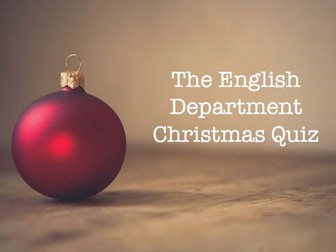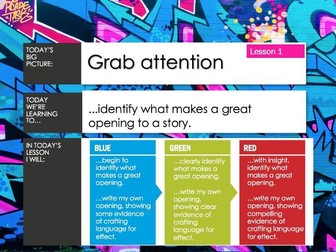Last minute English Language Exam revision game
Team games relating to skills needed for WJEC English Language GCSE exam. Designed to be a bit of light relief in between more intense revision sessions.
How to use a colon
A follow up to previous lesson on semi-colons. This shows students how to use a colon and then combines with using semi-colons.
Introduction to metacognition and metacognitive tools for students
This stafff presentation explains what metacognition is and why it is so important. It goes on to provide details of six different tools that can be used in the any classroom to develop students' meta-cognitive ability. <br />
All the tools have been tried and tested with students from Year 7 to Year 13. <br />
The presentation was developed on the back of a piece of academic research I condudcted into the effects of metacognition in the classroom.
New English Literature and Language GCSE Assessment Objective posters
Set of 12 Assessment Objective (AO) posters for the new English Literature and English Language GCSE. PowerPoint and PDF versions provided. Suitable for all exam board specifications. Easy to print. Logical images have been selected to represent each AO. If you prefer a more abstract style please view my other resources.<br />
<br />
The different Assessment Objectives (AOs) for GCSE English Literature and English Language (provided by the Department of Education and the exam boards) have been combined into one user-friendly poster set. Also included are the Spoken Language AOs, so everything you and your students need is in one place. Each AO has been allocated a memorable image to help students understand the different skills they need to master.<br />
<br />
The set of AOs are suitable for use from Year 7 right through to Year 11.<br />
<br />
Included in your download are:<br />
- A set of 12 x AO posters. The posters are available as a PowerPoint and PDF.<br />
- An overview document explaining how the AOs for GCSE Literature and Language have been combined.
undefined
Metacognition tools for students
After a year studying the impact of metacognition on academic results (and finding a really positive correlation)I put together a pack of 6 metacognitive tools for students to use in lesson.<br />
The resource explains each tool and provides some example responses.<br />
The tools are suitable for any subject and are easy to adapt for different abilities. <br />
The PowerPoint also includes clear information on what metacognition is and why it is important.
Word of the Week
Easy way to build students' vocabulary. One new word each week in first 5 minutes of first lesson. I try to pick a word that links to what the students are studying. They get bonus points if they create a sentence with the new word that links to the current topic. Display on classroom door and them move to internal Word of the Week wall.
English Christmas Quiz 2018
<p>A fun team quiz, perfect for the end of term.<br />
Six rounds covering generic English related topics.</p>
Metaphor, Irony and many more ... 22 x Literary Technique Posters
22 literary techniques defined in one matching poster set. <br />
<br />
Each poster features a clear definition and example. <br />
<br />
A4 portrait design, easy-to-print, and provided as both pdf and PowerPoint files.<br />
<br />
Literary techniques included are: alliteration, allusion, antagonist, assonance, caesura, connotation, dramatic irony, foreshadowing, hyperbole, irony, juxtaposition, metaphor, motif, parody, protagonist, onomatopoeia, oxymoron, personification, pun, simile, theme and tone
Travel Writing
Aimed at KS4 students with an E to C grade GCSE target (but easily adapted for KS3) this resources teaches students to use a range of vocabulary to create effect.<br /><br />
The easy-to-follow lesson plan and PowerPoint resource take students take students through an extract from Bill Bryson's 'A Walk in the Woods', which can be freely found online. <br /><br />
Students explore Bryson's use of language before developing a response to a typical GCSE written exam task. I taught this lesson in 2014 to a particular challenging Year 11 group and it was rated 'outstanding'.<br />
Memory Game
<strong>This simple game tests your students memory and observation skills in a fun and competitive way. </strong><br />
<ul><li>Suitable for KS2, 3 and 4.</li><br />
<li>All items to remember are stereotypically British.</li><br />
<li>First used on St George's Day but would work well for any units of work around culture and identity.</li></ul>
Persuasive technique posters
8 x A4 posters featuring key persuasive techniques. Download as a PDF or a PowerPoint file. The posters use the PERSUADE acronym to display the following techniques:<br />
P - personal pronouns<br />
E - exaggeration<br />
R - repetition<br />
S - statistics<br />
U - undermine opposing views<br />
A - anecdote<br />
D - direct address<br />
E - emotive language
Nominalisation and Passive and Active Voice
Using Elvis Presley and Jimi Hendrix as the topic for these two lessons, students will learn exactly what nominalisation is and how to do it before moving on to looking at using the passive and active voice.<br />
Designed for high ability KS4 both lessons have been tried, tested and enjoyed.<br />
Both lessons include clear delivery instructions in the notes section of each slide. <br />
No-fuss lessons that require minimal resources - just 1 sheet requires printing and students can use their exercise books and/or mini white boards. <br />
NEW English Language & Literature GCSE Assessment Objective resources
Set of 12 Assessment Objective (AO) posters for the new English Literature and English Language GCSE. PowerPoint and PDF versions provided. Suitable for all exam board specifications. Easy to print. <br />
<br />
PLUS PowerPoint lesson resource and worksheet to help students understand and remember the different AOs. <br />
<br />
The different Assessment Objectives (AOs) for GCSE English Literature and English Language (provided by the Department of Education and the exam boards) have been combined into one user-friendly poster set. Also included are the Spoken Language AOs, so everything you and your students need is in one place. Each AO has been allocated a memorable abstract image to help students think deeply about the different skills they need to master. <br />
<br />
The set of AOs are suitable for use from Year 7 right through to Year 11. <br />
<br />
Included in your download are:<br />
- A set of 12 x AO posters. The posters are available as a PowerPoint and PDF. <br />
- A PowerPoint lesson resource and student worksheet with the purpose of developing students’ retention and recall of each AO. <br />
- An overview document explaining how the AOs for GCSE Literature and Language have been combined.
A Brief History of the English Language
This lesson helps KS4 and 5 students to understand the development of the English Language. It helps to develop students' note-taking skills and tests their memory. <br /><br />
A full lesson plan, with ideas for personalisation and a homework task, is included. My Year 11 class told me that this was one of their favourite ever lessons because they learnt so much. <br /><br />
This lesson works by itself. It can also be used after a more philosophical introduction to the concept of language. This lesson is called 'SL_Intro2Language' resource.<br /><br />
<br />
Reading between the lines (inference skills and exploring Identity)
<strong>This PowerPoint works well as an introductory lesson to developing inference skills, as well as enabling students to explore their own identity. There is also a SPaG focus on using commas in list.</strong><br /><br />
<ul><li>The lesson starts with a fun and very visual memory game of stereotypical British icons, before leading students through an activity to define their own identity.</li> <br /><br />
<li>Students then analyse shopping receipts to make inferences about who might buy such products. </li><br /><br />
<li>Lesson plan has suggestions on both supporting and stretching students in each activity to allow for full personalisation.</li><br /><br />
<li>This lesson leads neatly to 'UsingCommas' resource.</li></ul>
Vocabulary builder
8 weeks worth of sophisticated words to help develop your students' vocabulary. The words work particularly well with units of work covering the theme of conflict. Suitable for both KS3 and KS4. Instructions and ideas for use included.
How to use a comma (and explore your own identity)
<strong>Teach your students how to use commas in a clear and fun way, whilst exploring their own identity.</strong><br /><br />
<ul><li>This PowerPoint has been designed for a 60 minute lesson and is suitable for both KS3 and 4. It can be taught alone or after using '1. Reading between the lines (inference and identity) Lesson' resource.</li><br /><br />
<li>Easy-to-follow lesson plan.</li><br /><br />
<li>Makes progress very clear to demonstrate.</li><br /><br />
<li>Ideas for personalisation included.</li> </ul><br /><br />
Story Writing Unit of Work
<p>A sequence of 15 lessons designed to teach students how to write a short story. Aimed at target grades 3 to 5.</p>
<p>Perfect preparation for the WJEC/EDUQAS English Language paper 1 exam. I used this with my year 11 class last year and it really helped them to hone their story writing skills. I’m an EDUQAS examiner and feel this scheme really taps into my knowledge of what the examiners are looking for in the narrative section of the exam.</p>
<p>Would also work really well as a non-exam related scheme for younger years. Each lesson has an easy to follow PowerPoint and accompanying resources (such as grammar worksheets and example stories) are provided.</p>
Christmas Quiz 2018
<p>Christmas Quiz ideal for form time or end of term lessons. Great fun whilst promoting team work and testing a range of key skills. Depending on number of rounds undertaken the quiz can last from 10 minutes to 1 hour.</p>
<p>Non subject specific.</p>
<p>The 4 rounds are:</p>
<ul>
<li>Memory round</li>
<li>Picture round</li>
<li>Give us a clue round</li>
<li>Multiple choice round</li>
</ul>


